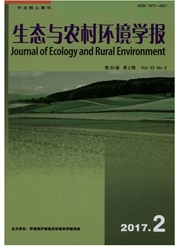

 中文摘要:
中文摘要:
通过现场调查试验,测定复垦区小麦(Triticum aestivum)不同生长期根系生长过程中根系分泌物、氮转化速率和2种酶活性的变化,以揭示煤矸石对小麦根系分泌物和氮转化的影响机理.结果表明:(1)煤矸石抑制生长期冬小麦的根长、根生物量和根系活力.(2)煤矸石的存在减少拔节期、开花期和成熟期冬小麦根际分泌速率Ⅰ(分别比对照农田减少25.47%、23.71%和9.95%)、Ⅱ(分别比对照农田减少39.83%、25.81%和10.84%),根际分泌速率Ⅲ在拔节期明显减少(比对照农田减少23.71%).根际分泌速率Ⅲ(y)与作物根系活力(x)呈正相关,回归方程为y=0.012x-0.43,R2=0.874(P〈0.05,n=30).(3)煤矸石对小麦不同生长期土壤氮转化速率和土壤酶活性抑制作用明显.土壤氮转化效率、土壤酶活性与土壤根系分泌速率Ⅱ呈显著正相关(P〈0.05),说明煤矸石可通过抑制植物根系分泌物的产生来减少土壤氮转化速率,可利用氮源的减少则进一步抑制了植物生长.
 英文摘要:
英文摘要:
To investigate fundamental mechanisms of coal gangue affecting winter wheat ( Triticum aestivum ) root exudation and nitrogen transformations, a field experiment was conducted on a tract of farmland reclaimed from coal gangue. Exudates from wheat roots, soil N transformation rate, and activities of two extracellular enzymes at various growth stages of the crop in the farmland were analyzed and determined. Results show that:( 1) The existence of coal gangue sig-nificantly decreased root length, root biomass and root activity of the crop wheat throughout its growth season;( 2) The ex-istence of coal gangue decreased root exudation rate Ⅰ by 25. 47%, 23. 71% and 9. 95%, respectively, and root exudation rate Ⅱ by 39. 83%, 25. 81% and 10. 84%, respectively at the jointing stage, flowering stage and maturing stage, and root exudation rateⅢdecreased significantly by 23. 71% at the jointing stage as compared with that of the crop in a control field. Root exudation rate Ⅲ( y) was found to be positively related to root activity( x) and the correlation could be fitted with the regression equation of y=0. 012x-0. 43,R2=0. 874( P〈0. 05, n=30);( 3) Coal gangue inhibited sig-nificantly N transformations and soil enzyme activities at all the growth stages, and the two were positively related to root exudation rate Ⅲ( P〈0. 05) , which suggests that coal gangue decreases N transformation rate by inhibiting crop root exu-dation, thus reducing the supply of available N and then restraining growth of the crop.
 同期刊论文项目
同期刊论文项目
 同项目期刊论文
同项目期刊论文
 期刊信息
期刊信息
